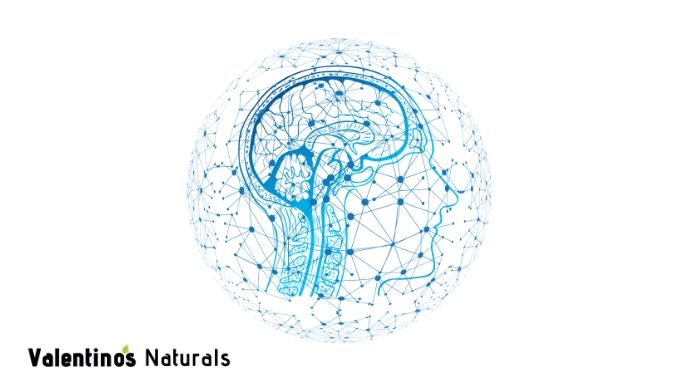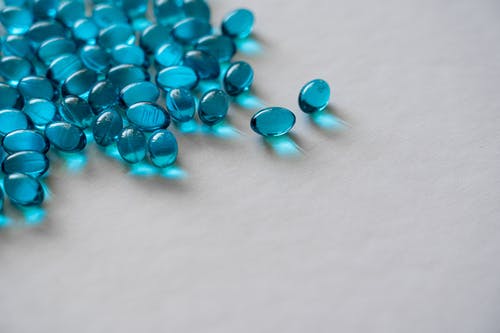Neurogenesis is a process where your brain creates new cells. This is shown to play a role in anxiety and mood disorders, memory, and depression. Read on to find out how to increase neurogenesis naturally.
For a long time, we thought that the brain stopped growing new neurons after childhood. (23) In 1961, scientists showed in mice that they grow new brain cells throughout life. (24)
How to increase neurogenesis naturally Intro
Today, we know that the same happens in our brain. It reshapes and changes over the course of our life, which is a phenomenon you may have heard of as neuroplasticity. (25)
However, the rate at which you grow new neurons can be greatly affected by certain things. Such as your lifestyle, diet, exercise, and genes. This then leads to the question: how to increase neurogenesis naturally?
– See The 5 Most Effective Herbs For Neurogenesis Here –
What is Neurogenesis?
First things first, what is neurogenesis? And why it’s important that you keep neurogenesis high at any age?
Neurogenesis simply means the growth of new neurons or brain cells. Science shows that neurogenesis occurs in two main areas of your brain: the subventricular zone (SVZ) and the hippocampus. Experts don’t yet fully know what SVZ does. (24)
Hippocampus is the part of your brain that regulates your memory, emotions, and spatial navigation. It’s what enables you to find your way in a new city. (25)
For neurogenesis to happen, you need precursor cells or stem cells. These are like blank slates that can turn into new neurons or other brain cells, depending on what’s needed. Stem cells are more versatile than precursor cells in what they can develop into. (27)
Why is Neurogenesis Important?
Okay, growing new neurons sounds cool right? But what does this actually do for us? And how does it feel?
As it turns out, neurogenesis is directly linked to your memory, mood, spatial navigation, and overall mental performance. See for yourself:
Neurogenesis and Memory
Neurons in the hippocampus allow us to store memories. Research shows that if we block the ability of the adult brain to create new neurons, then we also block certain cognitive functions related to memory.
People with poor neurogenesis – and by extension shrunken hippocampus – can have trouble navigating their way in the city, for example.
Neurogenesis and Depression
Studies in depressed animals show that they have low levels of neurogenesis.
Interestingly enough, if you give them antidepressants, then all of a sudden they start growing new neurons – and their depression symptoms subside. This means that there’s a clear link between depression and neurogenesis.

Even more stunning thing happens when you block neurogenesis in animal studies – it blocks the effects of the antidepressant.
Cognitive Decline
More and more experts agree that neurogenesis plays an integral part in keeping your brain sharp.
From improving memory formation to regulating mood, and even preventing age-related cognitive decline. It looks like keeping neurogenesis high can help ward off issues related to your long-range mental performance.
How to Increase Neurogenesis Naturally
So… how do you go about increasing neurogenesis? Well, it’s quite simple – some of us already do it daily without even knowing. Things like exercise, fasting, and nootropics are all shown to boost your brain’s ability to make new neurons.
Even learning a new musical instrument can increase nerve growth in your brain.
See for yourself:
#1: Run – How to increase neurogenesis naturally
Running is thrilling. People often say that it’s like a meditative activity that puts them in ‘the zone.’ As it turns out, running doesn’t just feel good but is also beneficial for brain cell growth.
In mice, running doubled their number of brain cells in the hippocampus. And in a study with 120 elderly people, aerobic exercise increased their grey matter in the hippocampus – reversing their age-related brain shrinkage by 1 to 2 years. (1, 2)
At the moment, we don’t know if it’s running specifically that’s causing neurogenesis. Or if it’s due to the increase in blood flow to the brain. In any case, exercise is good not just for your muscles but your brain too.
#2: Eat Brain Nurturing Food
So yes, staying active is key to a healthy and sharp brain – but that’s not all. What you eat also has an impact on your neuron growth in the hippocampus.

Brain food with nutrients that increase the growth of neurons include:
- Flavonoids – found in dark chocolate and blueberries. They build up in the brain over time, protecting it from damage, oxidative stress, and other ravages of aging. (7)
- Omega 3 fatty acids – as you may know, these are found in high quantities in fish. DHA, one of the omega-3 fatty acids, might be able to boost the creation of new connections between neurons in the hippocampus. (5)
- Resveratrol – you’ll find this in skins of grapes, as well as red wine. Many people say it’s responsible for the ‘French Paradox,’ where people from France are healthy and in good mental condition despite drinking alcohol and consuming plenty of fat. (6)
Spices like turmeric also promote neurogenesis. This particular spice contains the active compound curcumin. Curcumin, in turn, prevents a decline of BDNF (brain-derived neurotrophic factor) caused by stress. BDNF is important because it’s what stimulates new nerves to grow.
#3: Do a Fast
It’s not only what you eat, it’s also how much and when you eat that matters too. Fasting is an effective way to limit your daily calories, which has been shown to lead to better cognition, memory, neuron growth, and increased synaptic plasticity in the brain – enabling you to learn new things faster. (3)
Read: 6 Powerful Mental Benefits of Fasting
When you don’t consume any calories for a prolonged period of time, the body lowers the levels of leptin. A hormone triggered by fat. Consequently, this makes your neurons produce more energy. (4)
There are many fasting methods out there. Many people like the 16/8 fast also called “Intermittent Fasting” where you eat your last meal at 8 PM and then have your following meal the next day at 12 PM for lunch. This gives your brain a 16-hour fasting window.
#4: Reduce Alcohol and Processed Foods
On the other hand, when you constantly eat food, particularly those that are high in saturated fat, as well as consuming alcohol. These things will all reduce neurogenesis in your brain. (8)
Fret not, however. Resveratrol, which is found in red wine, is actually beneficial for neurogenesis. As you’ve seen above. Some speculate that this cancels out the negative effect of alcohol. Making red wine a potentially ‘neurogenesis-neutral’ beverage.
#5: Visit New Places
Traveling exposes your brain to novel situations, stimulating it to create new neurons. Paul Nussbaum claims that traveling causes the brain to “sprout new dendrites,” which are small extensions of your brain cells. Much like branches on a tree.

The good news is, you don’t need an expensive plane ticket to reap these benefits. A weekend road trip to a new place will have the same effect.
#6: Learn a New Instrument
Ever wanted to learn a new musical instrument? Consider brain growth as a motivation to get started!
Musicians show increased connectivity between brain regions. This is because playing a musical instrument is an intense experience that involves multiple senses. Your brain associates the movement patterns with sounds and visual cues by creating new neural networks.
#7: Sleep Well
Yes, something as simple as sleep is critically important for your neuronal plasticity, density, and growth. As it turns out, your brain retains and consolidates information during sleep.
One of the ways it achieves this is by increasing the growth of dendrites, which are tiny protrusions that connect your brain cells and allow them to send signals to each other. (11)
Aim to get at least 7 hours of sleep per night. For some people, 9 hours is more fitting. Whatever your sweet spot is, find it and stick to it religiously, if you’re looking to have a good memory, high neurogenesis, and optimal cognitive health.
If you have trouble with insomnia, try creating a bedtime routine. One that includes going at the same time to bed every night, along with drinking a relaxing tea and avoiding artificial light from screens for at least 1-2 hours before sleep.
#8: Have Sex
It’s hard to find something that sex doesn’t help with. If the studies are anything to go by, sex has a twofold benefit on our brains – it increases neuron growth in the hippocampus while also preventing neurogenesis levels from declining due to stress. As such, it is great for memory too. (9, 10)
#9: Meditate
Want to kill your neurogenesis? Stress as much as possible. It’s true, stress has serious negative effects on your brain cell growth. Luckily, doing something a simple as meditation is shown to literally increase the size of your hippocampus. This is thought to be mainly due to stress reduction from meditation. (12, 13)
Read: What Meditating Daily Does to Your Brain
#10: Take Nootropics
Nootropics are supplements that boost brain function. Different nootropics have different effects; some improve your mood, some enhance memory, while others increase neuron growth.
Bacopa Monnieri is an herb that may increase dendritic growth in your brain. As we saw, dendrites are small extensions of your brain cells that help transmit signals.

Lion’s Mane Mushroom is another natural nootropic that has shown to boost neurogenesis in the brain. One fascinating study showed that disabled animals that took Lion’s Mane Mushroom were able to walk again.
Other nootropics that may prevent a loss of neurons and increase neurogenesis include:
- Ashwagandha
- Rhodiola Rosea
- Piracetam (not natural)
- Phosphatidylcholine
What Can Negatively Influence Neurogenesis?
There are different factors that can hinder your brain’s ability to create new neurons and neural connections. These include:
- Stress – both physical and mental stress is shown to reduce neurogenesis. (18, 19)
- High fat and high sugar diets – studies show that these can trigger inflammation and oxidative stress leading to a decrease in neuronal tissue growth. (15)
- Lack of sleep – sleep deprivation can severely reduce the growth of new neurons in the brain. (17)
- Mood disorders – depression and neurogenesis are, as we’ve seen, closely linked. Depressed people tend to have reduced hippocampal grey matter. (16)
There are countless other factors that influence neurogenesis, some even include the texture of the food you eat.
Japanese experts found that if you eat a lot of soft food, you could risk having lower neurogenesis levels. Although there’s still more research needed to confirm this notion.
How to increase neurogenesis naturally FAQ
Can Neurogenesis Occur in Adults?
Yes, neurogenesis has been proven to occur in adult brains. The notion that our brains stop growing new neurons after childhood has been debunked by science a while ago.
One of the ways you can increase neurogenesis is by exercising. Physical activity in general is great for both your body and mind. Other ways through which you can promote neuron growth include:
- Eating plenty of flavonoid-rich foods, including blueberries, dark chocolate, and grapes
- Engaging in mentally stimulating activities such as learning new words or doing something with your opposite hand.
- Traveling to new places
- Taking nootropics such as DHA omega-3 fatty acid, Bacopa Monnieri, or Lion’s Mane Mushroom
Remember to avoid things that negatively influence neurogenesis. These include stress, eating highly inflammatory and processed food, and sleep deprivation.
Can You Restore Brain Cells?
According to research, it’s possible to restore brain cells through the process of neurogenesis.
This can be achieved through a number of ways; one of which is taking herbs like Ashwagandha, which is shown to “restore neurite outgrowth and protect neurons” from damage. (20)

Does Neurogenesis Make You Smarter?
You could say that neurogenesis makes you smarter. This is because it stimulates the birth of fresh brain cells in your hippocampus. An area of the brain critical for memory formation, word recall, spatial navigation, and mental well being. (21)
Does Neurogenesis Contribute to Brain Plasticity?
Yes, it does.
Since neurogenesis influences the shape of your brain circuits, it has a direct correlation with how ‘plastic’ your brain is.
The process of neuronal birth allows your brain to adapt to novel places and situations by building complex networks of neurons for memory, cognitive capacity, problem-solving, and spatial navigation. (22)
Conclusion on How to Increase Neurogenesis Naturally
An increase in neurogenesis often leads to better memory, mood, and overall mental performance. That’s because the hippocampus – an area of the brain where neurogenesis occurs – governs many of your cognitive processes.
There are many ways to increase neural growth; from exercising to taking neurogenesis herbs and nootropics like Rhodiola Rosea, Bacopa Monnieri, and Lion’s Mane Mushroom.
Of equal importance is avoiding stress, alcohol, toxins and highly processed foods, as these are all factors that can hinder your neurogenesis.
How to increase neurogenesis naturally References
- Running increases cell proliferation and neurogenesis in the adult mouse dentate gyrus. (source)
- Exercise training increases the size of hippocampus and improves memory. (source)
- Intermittent Fasting: Try This at Home for Brain Health. (source)
- New Year, New Understanding of How Fasting Affects the Brain. (source)
- Clearance of fear memory from the hippocampus through neurogenesis by omega-3 fatty acids: a novel preventive strategy for posttraumatic stress disorder? (source)
- Resveratrol: A Potential Hippocampal Plasticity Enhancer. (source)
- Chocolate and the brain: neurobiological impact of cocoa flavanols on cognition and behavior. (source)
- Impact of diet on adult hippocampal neurogenesis. (source)
- Sexual Experience Promotes Adult Neurogenesis in the Hippocampus Despite an Initial Elevation in Stress Hormones. (source)
- Sexual activity counteracts the suppressive effects of chronic stress on adult hippocampal neurogenesis and recognition memory. (source)
- Sleep after learning strengthens connections between brain cells and enhances memory. (source)
- The underlying anatomical correlates of long-term meditation: Larger hippocampal and frontal volumes of gray matter. (source)
- Mindfulness practice leads to increases in regional brain gray matter density. (source)
- Neurogenesis in the dentate gyrus of the adult tree shrew is regulated by psychosocial stress and NMDA receptor activation. (source)
- Nutritional Factors Affecting Adult Neurogenesis and Cognitive Function. (source)
- Adult neurogenesis. (source)
- Sleep deprivation inhibits adult neurogenesis in the hippocampus by elevating glucocorticoids. (source)
- Reduced cell proliferation in the dentate gyrus is not correlated with the development of learned helplessness. (source)
- Neurogenesis in the dentate gyrus of the adult tree shrew is regulated by psychosocial stress and NMDA receptor activation. (source)
- Withania somnifera (L.) Dunal ameliorates neurodegeneration and cognitive impairments associated with systemic inflammation. (source)
- Adult Neurogenesis Conserves Hippocampal Memory Capacity. (source)
- Adult neurogenesis: a substrate for experience-dependent change. (source)
- Life-long stability of neurons: a century of research on neurogenesis, neuronal death and neuron quantification in adult CNS. (source)
- The subependymal layer of the mouse brain and its cell production as shown by radioautography after thymidine‐H3 injection. (source)
- Adult Neurogenesis in the Mammalian Brain: Significant Answers and Significant Questions. (source)
- What does the hippocampus really do? (source)
- Stem cell information. (source)



